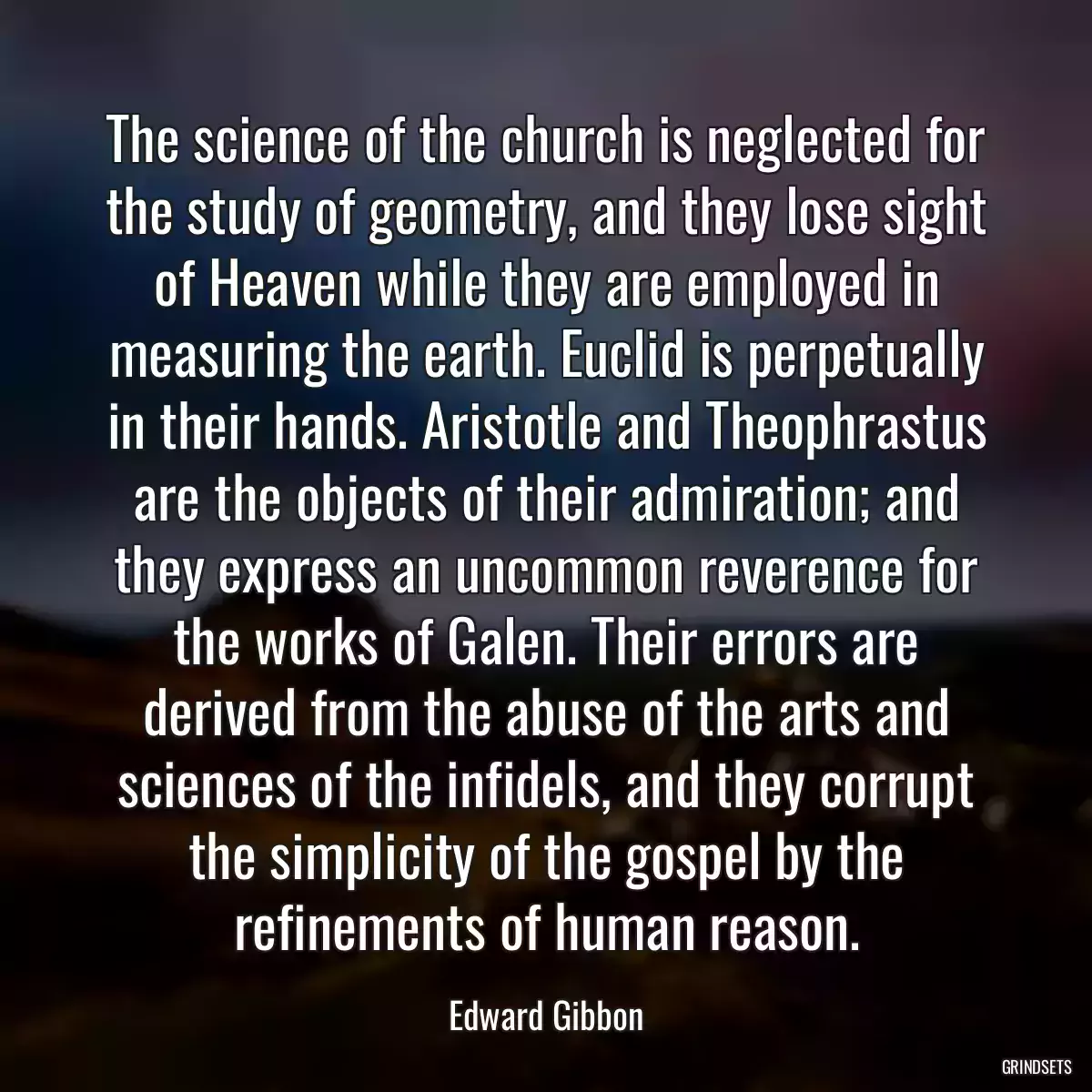
Quotes Edward Gibbon
Find dozens of Edward Gibbon with images to copy and share.

The winds and waves are always on the side of the ablest navigators.
To the University of Oxford I acknowledge no obligation; and she will as cheerfully renounce me for a son, as I am willing to disclaim her for a mother. I spent fourteen months at Magdalen College: they proved the fourteen months the most idle and unprofitable of my whole life.
The chaste severity of the fathers in whatever related to the commerce of the two sexes flowed from the same principle -- their abhorrence of every enjoyment which might gratify the sensual and degrade the spiritual nature of man. It was their favourite opinion, that if Adam had preserved his obedience to the Creator, he would have lived for ever in a state of virgin purity, and that some harmless mode of vegetation might have peopled paradise with a race of innocent and immortal beings.
You may also like
The nations, and the sects, of the Roman world, admitted with equal credulity, and similar abhorrence, the reality of that infernal art [witchcraft], which was able to control the eternal order of the planets, and the voluntary operations of the human mind. . . . They believed, with the wildest inconsistency, that this preternatural dominion of the air, of earth, and of hell, was exercised, from the vilest motives of malice or gain, by some wrinkled hags and itinerant sorcerers, who passed their obscure lives in penury and contempt.
The image of a free constitution was preserved with decent reverence: the Roman senate appeared to possess the sovereign authority, and devolved on the emperors all the executive powers of government. During a happy period (A.D. 98-180) of more than fourscore years, the public administration was conducted by the virtue and abilities of Nerva, Trajan, Hadrian, and the two Antonines.
The love of action is a principle of a much stronger and more doubtful nature. It often leads to anger, to ambition, and to revenge; but when it is guided by the sense of propriety and benevolence, it becomes the parent of every virtue, and, if those virtues are accompanied with equal abilities, a family, a state, or an empire may be indebted for their safety and prosperity to the undaunted courage of a single man.
Philosophy alone can boast (and perhaps it is no more than the boast of philosophy), that her gentle hand is able to eradicate from the human mind the latent and deadly principle of fanaticism.
One must search diligently to find laudatory comments on education (other than those pious platitudes which are fodder for commencement speeches). It appears that most persons who have achieved fame and success in the world of ideas are cynical about formal education. These people are a select few, who often achieved success in spite of their education, or even without it. As has been said, the clever largely educate themselves, those less able aren't sufficiently clever or imaginative to benefit much from education.
![According to the faith and mercy of his Christian enemies, [Chosroes] sunk without hope into a still deeper abyss [Hell]; and it will not be denied, that tyrants of every age and sect are the best entitled to such infernal abodes.](/fotos/73/736b082652155bc16cc2571e73cbbd0a.webp)
In old age the consolation of hope is reserved for the tenderness of parents, who commence a new life in their children, the faith of enthusiasts, who sing hallelujahs above the clouds; and the vanity of authors, who presume the immortality of their name and writings.
To resume, in a few words, the system of the Imperial government, as it was instituted by Augustus, and maintained by those princes who understood their own interest and that of the people, it may be defined an absolute monarchy disguised by the forms of a commonwealth. The masters of the Roman world surrounded their throne with darkness, concealed their irresistible strength, and humbly professed themselves the accountable ministers of the senate, whose supreme decrees they dictated and obeyed.
An extensive empire must be supported by a refined system of policy and oppression; in the centre, an absolute power, prompt in action and rich in resources; a swift and easy communication with the extreme parts; fortifications to check the first effort of rebellion; a regular administration to protect and punish; and a well-disciplined army to inspire fear, without provoking discontent and despair.
A nation of slaves is always prepared to applaud the clemency of their master who, in the abuse of absolute power, does not proceed to the last extremes of injustice and oppression.
An absolute monarch, who is rich without patrimony, may be charitable without merit; and Constantine too easily believed that he should purchase the favour of Heaven if he maintained the idle at the expense of the industrious, and distributed among the saints the wealth of the republic.
Greek is a musical and prolific language, that gives a soul to the objects of sense, and a body to the abstractions of philosophy.
But this inestimable privilege was soon violated: with the knowledge of truth the emperor imbibed the maxims of persecution; and the sects which dissented from the catholic church were afflicted and oppressed by the triumph of Christianity. Constantine easily believed that the heretics, who presumed to dispute his opinions or to oppose his commands, were guilty of the most absurd and criminal obstinacy; and that a seasonable application of moderate severities might save those unhappy men from the danger of an everlasting condemnation.
It is incumbent on us diligently to remember that the kingdom of heaven was promised to the poor in spirit, and that minds afflicted by calamity and the contempt of mankind cheerfully listen to the divine promise of future happiness; while, on the contrary, the fortunate are satisfied with the possession of this world; and the wise abuse in doubt and dispute their vain superiority of reason and knowledge.
You may also like

The science of the church is neglected for the study of geometry, and they lose sight of Heaven while they are employed in measuring the earth. Euclid is perpetually in their hands. Aristotle and Theophrastus are the objects of their admiration; and they express an uncommon reverence for the works of Galen. Their errors are derived from the abuse of the arts and sciences of the infidels, and they corrupt the simplicity of the gospel by the refinements of human reason.
A jurisdiction thus vague and arbitrary was exposed to the most dangerous abuse: the substance, as well as the form, of justice were often sacrificed to the prejudices of virtue, the bias of laudable affection, and the grosser seductions of interest or resentment.